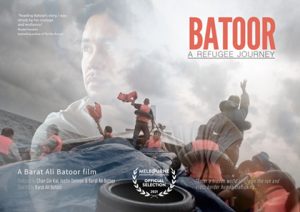Film exposes the human face of refugee journeys
A new film by Afghani photojournalist, filmmaker and former refugee Barat Ali Batoor that chronicles an asylum seeker boat journey is part of this year’s Melbourne Documentary Film Festival.
The film ‘Batoor: A Refugee Journey’ will be screened at the Cinema Nova on July 22.
 It tells the story of Batoor’s own attempted boat journey from Indonesia to Australia in 2012 as well as his longer journey fleeing death threats and danger in his homeland.
It tells the story of Batoor’s own attempted boat journey from Indonesia to Australia in 2012 as well as his longer journey fleeing death threats and danger in his homeland.
The film also highlights the plight of asylum seekers and the repression of ethnic minorities, including his own Hazara people.
Batoor accompanied a group of asylum seekers on a hazardous and ill-fated boat journey from a remote Indonesian island to Christmas Island in September, 2012.
On the trip the boat started to sink and Batoor and others swam to a nearby island where they were arrested by Indonesian police.
A still image taken by Batoor on the voyage won the 2013 ‘Photo of the Year’ in the prestigious Nikon-Walkley Press Photography awards.
In 2015, Batoor went back to Pakistan to document the stories of the Hazaras who were under constant targeted attacks and bomb blasts in Quetta city. The increased insecurity and marginalisation of the Hazaras forced many of them to leave Pakistan and seek asylum in a third country. Most of them tried to come to Australia by sea.
In his film, Batoor highlights the challenges the Hazara people faced effectively living in a ghetto; he documents their forced migration and the unseen and often perilous journeys taken with people smugglers attempting to reach Australia.
The film also takes viewers on own Batoor’s gripping journey — one that reached a watershed when, in a photo series, he documented the injustice done to the ‘Dancing Boys’ and the practice called ‘Bacha Bazi’ a tradition found across Afghanistan involving the sexual exploitation of boys.
He was forced to flee to find safety, like other journalists and whistle blowers who face threats to their life from exposing the wrongdoings of those in power.
Born in Pakistan, Batoor moved to Afghanistan to work as a photojournalist in 2005. His parents had fled the country in the early 70s because of the discrimination they experienced as Hazaras, an ethnic minority group in Afghanistan that has faced political, economic and social repression for more than a century.
“I just tried my best to show what is really happening. My hope is that the film will tell the story of people seeking safety,” Batoor said of his film.
“These journeys mix fear, boredom and extreme loneliness. They sometimes end happily, sometimes in despair and sometimes in death. I was lucky. I survived and I was quickly found to be a refugee and resettled in Melbourne,” Batoor said.
In September 2012, he became part of his own story, fleeing Kabul with his camera in hand.
Travelling with 92 other passengers hidden below deck to escape detection by the Water Police, he shot a selection of images capturing the long route through Thailand, Malaysia, Indonesia and by sea to Australia.
“It is a journey of sudden midnight departures, long road trips, surreptitious transactions, treks through jungles, and terror at sea,” Batoor said.
“Few people – except for the refugees themselves – ever get to see this reality.”
Batoor’s boat ran aground on the rocks and his camera was ruined but remarkably, his images survived.
He was then detained and robbed by Indonesian authorities but escaped. Many of the other people he met on his arduous journey didn’t survive.
He now works as a Program Co-ordinator with the Asylum Seeker Resource Centre in Melbourne.
For details on how to book, go to: http://www.cinemanova.com.au/films/mdff-batoordo-nothing-and-do-it-well
To see a trailer of the film, click here: https://www.youtube.com/watch?v=X44QSvVoQB4&t=1s












